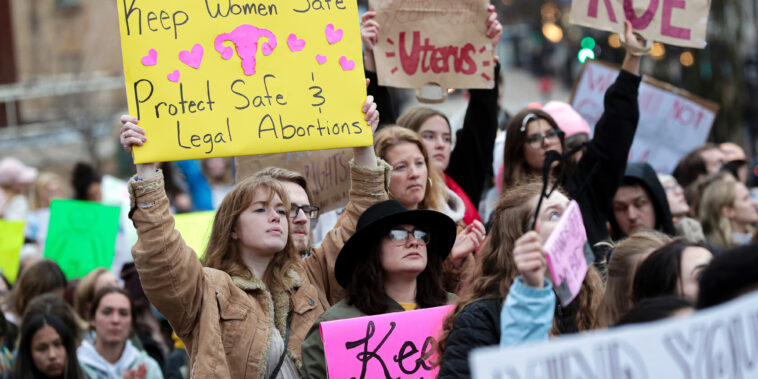
The Southwest as a Key Battleground for Reproductive Rights
The intersection of politics and reproductive health in the United States is continually evolving, and the Southwest region is no exception. With the recent surge in interest regarding abortion laws and reproductive healthcare access in both Nevada and Arizona, the Southwest offers an excellent opportunity to analyze national trends and America’s views towards bodily autonomy.
Enshrining Abortion Rights into State Constitutions
In November later of this year, Nevada is set to vote on a ballot initiative that would enshrine a woman’s right to abortions in the state constitution. The initiative’s proponents argue that permanent protections for a woman’s right are necessary given the various attacks on reproductive healthcare in the United States.
The initiative would allow abortion until fetal viability, but there would be exceptions past that point for lifesaving treatment. Though Nevada is already supportive of the right to choose, with 45% of voters supporting abortion under any circumstances, advocates say that attaining further protections for reproductive healthcare is crucial.
The initiative faces an additional burden as state law requires the amendment to be approved in two consecutive elections to amend Nevada’s constitution. “We are looking to mobilize people, particularly young people and voters of color. We are going to talk to folks that maybe haven’t voted before,” said Lindsey Harmon, president of the Nevadans for Reproductive Freedom, speaking on the effort to achieve more reproductive healthcare protections in Nevada. “This is a nonpartisan effort to get both Republicans and Democrats alike to come out and take issue on this.”
Impact on Diverse Communities
The Southwest region encompasses a diversity of urban and rural areas, with unique demographic makeup that comprises significant Latino, Indigenous, and immigrant populations. Records from Pew Research Center in 2019 indicate that half of the US Latino population lived in Southwest border states alone. Examining abortion access in these states, therefore, offers insights into how reproductive policies uniquely affect these diverse communities.
In Nevada and Arizona, with a mix of conservative and liberal influences, reproductive healthcare is taking center stage in politics. In these states, insights into how abortion policies play out can prove a broader perspective, reflecting national trends. Additionally, the Southwest region has provided the issue of reproductive justice with an excellent opportunity for in-depth examination, analyzing how policies disproportionately impact specific groups, among other related matters.
The Arizona for Abortion Access Campaign Initiatives
Arizona for Abortion Access campaign announced recently that it filed over 823, 685 signatures, above the 383, 923 that Arizona law requires to appear on a ballot. The initiative aims to repeal a 15-week restriction on abortion and protect Arizona’s right to choose, but there’s been uncertainty about when the exception applies, leaving doctors uncertain and some patients opting to seek care in neighboring states.
If the initiative passes in November, it could lead to increased abortion accessibility where it’s most needed. “What we would win here in Arizona by enshrining abortion rights in our Constitution would be that we would be another state where folks who live in places without access can come to Arizona. More importantly, Arizonans get to stay here and get the healthcare that they need and deserve,” notes Chris Love, Arizona for Abortion Access spokesperson and senior advisor for Planned Parenthood Advocates of Arizona.
The Fight against Fetal Personification Laws
Last week the Arizona for Abortion group filed a lawsuit against a Republican-led local legislative group aiming to include language in voter pamphlets that describes a fetus as an “unborn human being.” According to a report by the Associated Press, these pamphlets are used by voters to learn more about the ballot issues they are voting on. However, advocates argue that the phrase is a display of “fetal personhood” by abortion advocates and health experts, and it seeks to give legal rights to fetuses or embryos.
Chris Love of Planned Parenthood Advocates of Arizona explains that using the phrase ‘unborn human being’ implies bias in the pamphlets, and it’s something repeatedly used by anti-abortion activists, but it’s not neutral. Instead, they want Arizona voters to make their choices based on facts and neutral information while considering all the relevant factors that go into various policies concerning reproductive health issues.
Influx of Patients in Southwest States
While southwestern states such as Arizona and New Mexico act as abortion travel destinations for those fleeing restrictive laws in surrounding states, such laws’ effects can result in an influx of patients seeking reproductive healthcare leading to extended wait times. Recent reports from the office of Sen. Maria Cantwell and Majority Leader Charles E. Schumer have shown that clinics in both Nevada and New Mexico have experienced extended wait times due to the influx of patients, but they’ve expanded capacity by hiring more staff and utilizing telehealth.
One significant challenge in these areas is improving access to reproductive healthcare facilities and decreasing wait times, and there is a renewed effort to ensure that reproductive health care facilities are much more accessible. Furthermore, the Arizona for Abortion Access Campaign aims to reach communities in every corner of the state in a bid to ensure that public awareness of reproductive health issues is more significant than ever before. This goal is especially important for minority communities disproportionately affected by reproductive healthcare barriers as they adjust to the changing healthcare landscape.
Conclusion
As we approach the 2024 elections, issues of bodily autonomy and reproductive health care will continue to be at the forefront of the political discourse. Nevada and Arizona’s efforts to enshrine abortion rights offer lessons on how different states tackle Obamacare and reproductive health policies with varying degrees of success. To promote healthier and more equitable communities, we must continue to advocate for policies and initiatives that improve access to reproductive healthcare facilities and services while remaining committed to protecting the rights of women everywhere to control their bodies.
Originally Post From https://www.reckon.news/family/2024/07/abortion-access-in-the-southwest-how-arizona-and-nevada-can-shape-the-future.html
Read more about this topic at
Abortion access in the Southwest: How Arizona and Nevada …
Abortion access in the Southwest: How Arizona and …


